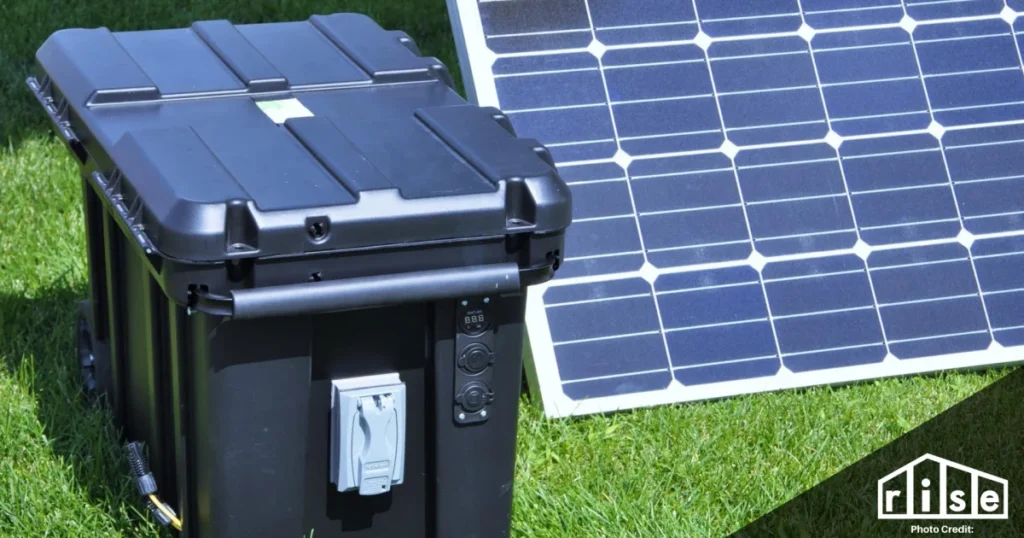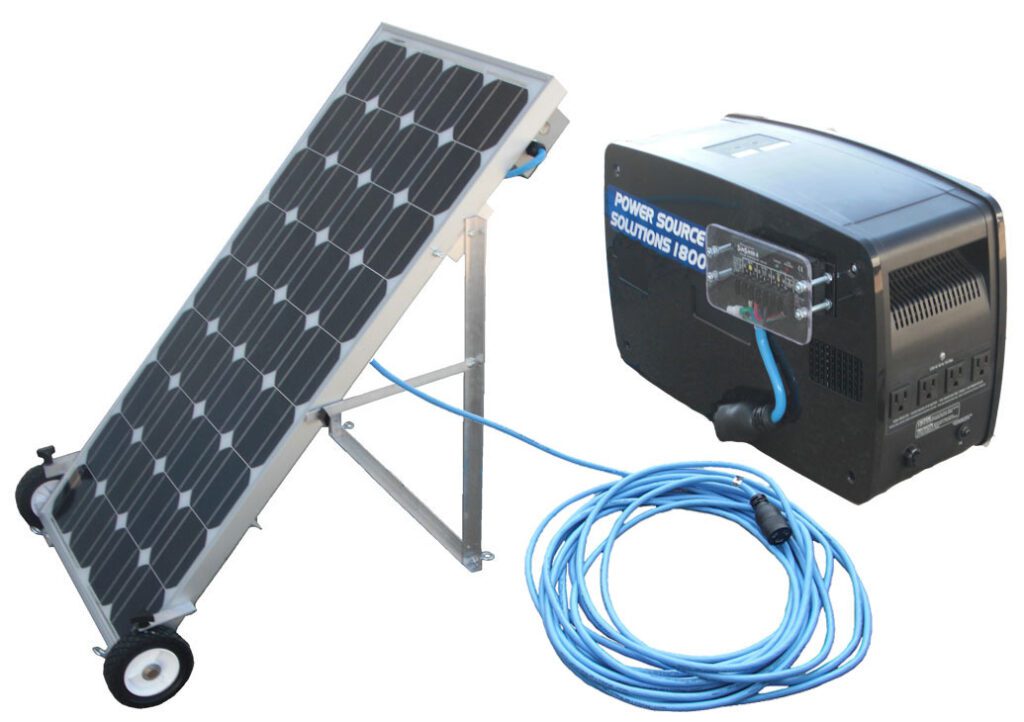At the heart of this solar revolution lies an innovative technology known as the solar generator. In this article, we start a journey. We will uncover the details of solar generators. We will explore their workings, benefits, uses, and more.
What is a Solar Power Generator?
Using solar energy is not new. But the ways we get and use it have changed a lot. Solar power generators combine solar tech with portable power. They are a symbol of this change. Solar generators work by converting sunlight into electricity. They store it for later use and make no hazardous pollutants.
This sets them apart from generators that rely on fossil fuels. We can see a future where our energy needs are met with the least harm. This will be thanks to this amazing technology. Solar generators have many uses and are increasingly available. They lead the renewable energy revolution. They offer a long-term substitute for conventional power.
As we delve deeper into solar generators, it becomes clear that they are important for more than the environment. These devices represent a leap towards energy independence. They offer a reliable power source that works anywhere the sun shines.

How Do Solar Generators Work?
A solar generator is a marvel of modern engineering. It has many crucial parts. They work together to turn sunlight into usable power. The system’s main part is the solar panel. Many photovoltaic cells make up.
They collect sunlight and make a direct current (DC). The solar charge controller receives this current. It regulates the flow to the battery to ensure safe and efficient charging. The battery stores DC power. But, household equipment uses AC power. Here’s when the inverter comes into play. By converting DC to AC it enables us to use power for a variety of purposes.
The system is managed through a user interface. It allows for monitoring and control. This ensures the solar generator works well and lasts a long time.
This intricate process turns sunlight into electricity. It shows the elegance and efficiency of solar generators. These devices harness the sun’s energy. They offer a renewable power source. You can use it in many settings from remote outdoor adventures to home energy solutions.
Benefits of Using Solar Generators
Beyond their detrimental effects on the environment solar generators provide many advantages. One big benefit is using fewer fossil fuels. They are a finite resource. They greatly add to global pollution and climate change. By choosing solar generators, people may lessen these issues and encourage a cleaner, healthier planet.
Portability and Versatility
Another significant benefit of solar generators is their portability and versatility. They can provide electricity in remote locations. These include off-grid cabins and camping grounds. This is due to their small size and ease of movement. They ensure that modern conveniences are always available. Solar generators are very helpful in emergencies because they are portable. They provide reliable power if traditional utilities fail.
Economical benefits
Furthermore, over time, solar generators have proven to be extremely economical. Even though the initial cost might be higher than that of traditional generators. But, over time, there are big savings. This is because there are no fuel costs, and maintenance is cheap. This financial benefit. Also, the chance to get government subsidies and incentives for using solar energy. These things make solar generators a great choice for anyone trying to cut their energy costs.
Best Solar Generators
When choosing a solar generator for your home, pick one with enough capacity and dependability. It will be your main or backup power source. Of the models on the market, a few stand out for their user-friendliness, performance, and durability.
One such generator is the [Jackery] Solar Generator. It is known for its big battery and good solar panels. It can power key household appliances during blackouts. It can also be part of a renewable energy system. Another good model is the [BLUETTI] Power Station. It has a sturdy build and many charging options.

Choose the best solar generator for your home by evaluating your energy needs. Consider the quantity and type of appliances you want to power. Talking to professionals and reading user reviews can also provide insights. They help in picking a generator that best fits your life and energy goals.
Cost of Solar Generators
| Solar Generator Model | Power Output (Watts) | Battery Capacity (Wh) | Price ($) |
| Jackery | 300 | 200 | 200 |
| EF ECO FLOW | 600 | 288 | 184 |
| PowerFort | 99 | 150 | 86 |
| bluetti | 600 | 268 | 299 |
Maintenance Tips for Generators
The battery, a critical component of the solar generator, also requires attention. Ensuring it is not overcharged or allowed to deplete entirely can extend its lifespan. Most modern solar generators have charge controllers. They manage this automatically, but you should still do periodic checks.
By following the manufacturer’s care guidelines, users can enjoy their solar generator for many years. It will be a sustainable and cost-effective energy solution.
Solar Generator vs. Traditional Generator
People argue about renewable versus non-renewable energy. This is reflected in the debate between solar and conventional generators. Conventional generators can make power at any time and in any weather. But, they need fossil fuels. This raises pollution and greenhouse gas emissions. Solar generators, on the other hand, use the energy of the sun to provide a clean, renewable alternative.

Solar radiation availability affects their effectiveness. However, advances in battery storage tech have greatly increased their usefulness and dependability. In the end, personal preferences and situations will decide. They will choose between solar and conventional generators. Solar generators are attractive for people who value sustainability and long-term savings. They support the goals of energy independence and environmental stewardship.
FAQs
1. What are the components of a solar power generator?
Solar panels, a charge controller, and batteries store energy. An inverter, wiring, and connectors are also part of a solar power system. The inverter converts DC electricity to AC power when needed.
2. What size solar power generator do I need for my home?
The location and amount of energy you use will determine the solar power generator’s size. Variables include the number of appliances. Also, the number of hours used and the sunlight accessible. A professional evaluation can determine the ideal size for your needs.
3. Can a solar power generator work during cloudy days or at night?
Solar panels are most efficient in direct sunlight. But, they can still make some electricity on cloudy days. However, energy production is reduced. At night, solar panels cannot generate electricity unless paired with a backup battery system.
4. How long do solar power generators last?
The solar panels on solar power generators usually last 25 to 30 years, which is an extended lifespan. Some parts, like batteries, need replacement every five to ten years. The timing depends on use and upkeep.
5. Are solar power generators noisy?
No, solar power generators are silent. This is because they have no moving parts, except for some charge controllers. This makes them suitable for residential areas and environmentally sensitive locations.